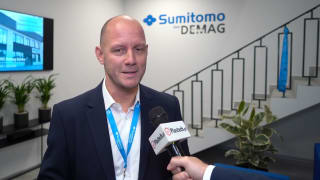
Fanuc had been ahead of its time when in 1985 they started producing special injection moulding machines. While European producers developed hydraulic machines, the Japanese company focussed on Autoshot all-electric drive machines, which developed later into today`s Roboshot models. Today European makers also offer the cost-effective all electric models, but it took quite a while for them to pick up.
There is a view prevalent in the market that the predominant production of all-electric IMMs in Japan originated from prohibition of indoor hydraulic oil storage in the country’s industry in the 1950’s – preventive fire protection regulations. When pressed on this point, Fanuc Europe Corporation President & CEO Shinichi Tanzawa, preferred to stress all-electric IMM advantages over hydraulic and hybrid drives of higher efficiency in energy consumption, higher accuracy and much less maintenance. One example of this dedication is a new 450-tonne clamping force Roboshot presented at Fakuma.
Tanzawa comments “Although everyone in Europe talks about the environment and energy consumption, the trend still hasn’t fully worked through to the European IMM market as it has in Japan. But once that happens, I am sure we can grow a lot more”. Today, with Fanuc operating independently in Europe, the practical limit remains at or close to 450 tonnes, as electric motors needed for much higher tonnages become cumbersome: “we will not use hydraulic drive on our IMMs”, Tanzawa stressed.
Tanzawa added “Our product itself has high quality and durability. We monitor mean time between failure (MTBF). As we have also experienced in our CNC machine tool and robot businesses, our MTBF for the Roboshots is not months, but typically more than 10 years”, the only prerequisite being a proper maintenance after installation. In September 2018, Tanzawa said, Fanuc had installed an accumulated total of 6,500 Roboshots in Europe, 60,000 worldwide.
Tanzawa says all-electric IMMs now account for a 30% market share in Europe, with Fanuc accounting for about 20% of all-electric IMMs supplied in Europe. He admits sales need more commitment in Austria and Germany due to strong presence of local IMM producers. While most but not all European producers have meanwhile also got onto the all-electric ‘bandwagon’ after initial reserve, they still retain hydraulic drive models.
Robots is Fanuc’s largest area with 550,000 robots installed worldwide and 13,000 robots/year sold in Europe accounting for 60% of the company’s European business. “It depends very much on automotive projects, our biggest volume business, which fluctuates a lot”, Tanzawa explains. To the present day, the company has also supplied more than four million CNC control systems as well as 18 million servodrives worldwide.
Although Fanuc has started offering collaborative robots (cobots), which are painted green as opposed to the Fanuc corporate yellow on all other equipment, Tanzawa says that such cobots, working with humans with protective sensors without needing protective fencing, isn’t a big volume business yet, “even if some people want to make it a trend”. He added: “We are a little bit shy in marketing cobots, as we want to go step by step. It is hard to say which way the trend will go, but we can be relaxed, as we have a great lineup of conventional robots as well as cobots. Many European customers are checking our cobots”. Tanzawa claims, “Unlike some very cheap competitors’ cobots, ours have a high accuracy and durability”.
The next largest area after robots is the CNC machine tool business with Robodrill, Robocut as well as Robonano (debut in 2018) machines for the metalworking industry in general and also for mould making in the plastics industry. Four million systems have been installed worldwide. The machine tool and Roboshot businesses are still increasing, but at a lower rate than with robots. Although Tanzawa sees most potential in robots, where Fanuc dominates the market in Japan and America, the company has a more challenging task in Europe, where ‘local’ producers are serious competitors, with their robots also widely used with IMMs.
Although a free trade agreement signed 17th July 2018 between the EU and Japan benefits Fanuc’s business in Europe, Tanzawa says “the import duty for the products we import from Japan has not been very high”. More important for the company has been a strong, fast and good service approach during the past few years, as a priority over sales. The philosophy behind this is that better service benefits customers, leading them to prefer Fanuc machines in the future, also due to high quality, reliability and longevity of the machines.



